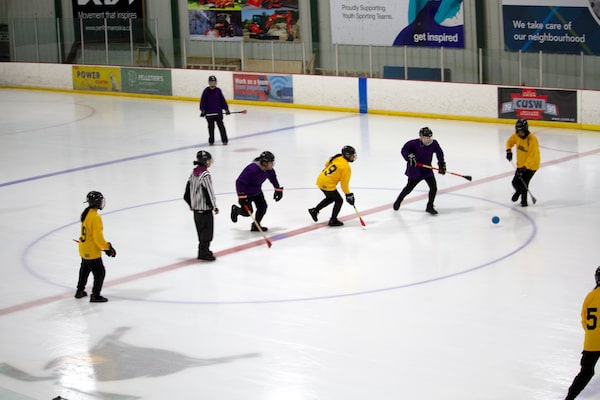
Kids playing broomball at the Tournament of Hope in Thunder Bay.Ethan Bell/Handout
Titus Semple has long known that sports can bring youth together – there are several hockey and broomball events throughout the year in Northwestern Ontario where thousands of First Nations kids from remote communities participate.
But with the rise in youth suicides in Nishnawbe Aski Nation (NAN), he knew it was going to take more than just sports to have the needed impact when grassroots leaders asked him last summer to do something to help young people.
Mr. Semple runs Semple Enterprises Ltd., a Thunder Bay company that provides products and services to Northern communities. He said the suicides in the First Nation, a territory of 49 Treaty 9 and 5 communities, during the pandemic was ringing alarm bells. Something needed to be done to bring youth together to generate hope.
“It’s taking a toll on the people in the communities that we’re losing all these youth, young people to suicide,” he said. “We needed to just kind of step up and do something about it.”
He said they didn’t want to have “just another hockey tournament” – he has organized a memorial men’s hockey event for several years – but rather “something that was going to bring kids together in order to open up the conversations around mental-health awareness and suicide awareness.”
Nearly 30 teams participated in the inaugural Tournament of Hope last week in Thunder Bay, competing in a mix of hockey and broomball. There was also a range of non-sporting activities including workshops, a career fair and guest motivational speakers such as Brady Leavold, a former National Hockey League prospect who overcame a life of addiction and street crime.
Olympic women’s hockey star Brigette Lacquette and former NHLer Reggie Leach closed out the week as keynote speakers at a gala attended by nearly 400 youth.
Mr. Semple said the various non-sporting events provided throughout the week allowed kids to start processing their traumas and abuses, adding that mental-health supports were on hand.
“We wanted to open up the conversation and allow these kids to begin talking about the stuff that they’re internalizing and we were able to do that,” he said.
William Kaminiwash is the executive director of the Reverend Tommy Beardy Memorial Family Treatment Centre in Muskrat Dam, about 580 kilometres north of Thunder Bay, who approached Mr. Semple last summer about addressing youth suicides in the north.
“I wasn’t sure how we’re going to go about this because many organizations, even church groups don’t seem to know what to do,” he said.
He said one of the most common traumas families deal with at the treatment centre is related to suicide. The treatment centre accommodates five families for six-week programs and has a three-year waiting list. It’s the only family treatment facility in NAN territory.
He said it’s often easier to open up about internal trauma and pain when people are in new environments, where they feel safe and comfortable.
NAN has faced a suicide epidemic for decades, with nearly 700 suicides since 1986, Mr. Semple said. A NAN report states that 39 youth between the ages of 10 and 20 died by suicide between 2017 and 2019. Indigenous Services Canada funds the Choose Life program for NAN, aimed at culturally relevant suicide-prevention programming for communities.
Isaac Linklater from Sandy Lake competed in the broomball portion of last week’s tournament, and said he had fun hanging out with friends.
“I really liked watching other teams play and going against others in the games, it was exciting,” the 13-year old said.
After hanging up the skates, Isaac and his friends went shopping for their outfits for the gala, said his mom, Una Gott. She said these events are important and help to break intergenerational traumas for First Nations people.
“I grew up in a world where we were told to sit down and be quiet and not show feelings,” she said. “I love that the next generation has so many of these opportunities and experiences so that they are more open to sharing their feelings and dealing with mental health.”
Mr. Semple said he hopes the Tournament of Hope eventually will be funded annually by the federal government, while Mr. Kaminiwash said he hopes to see it grow to include more activities in arts, fashion and music.
 Willow Fiddler
Willow Fiddler